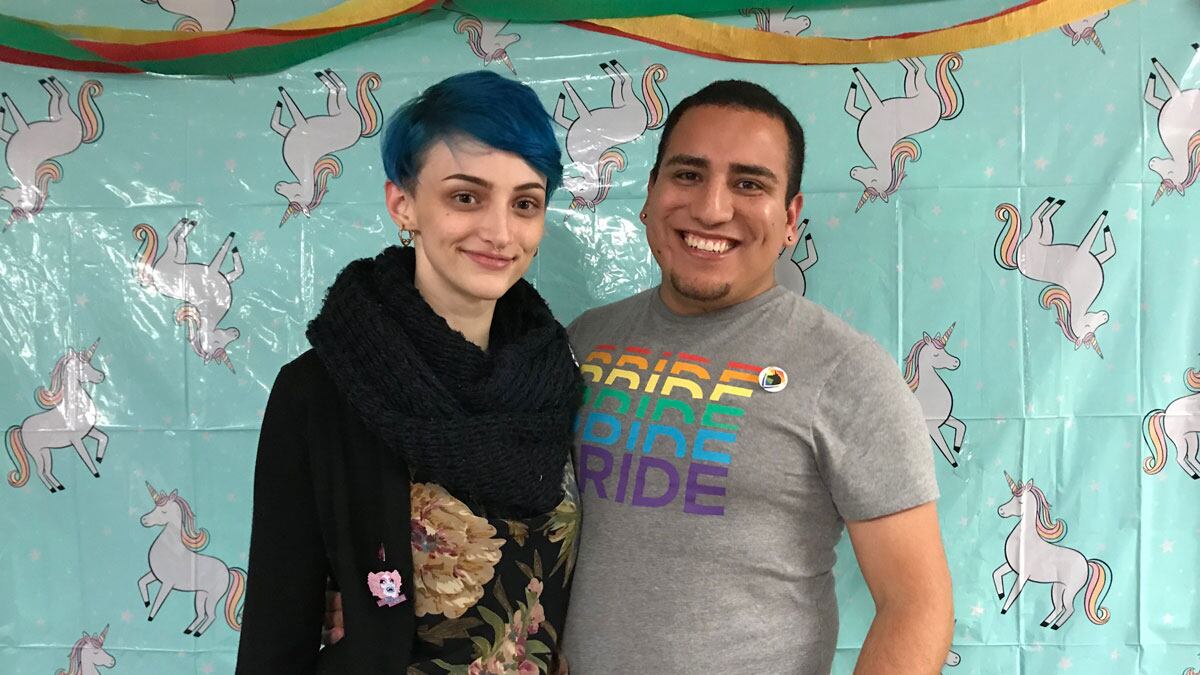A student group that supported LGBTQ students at Concordia University shut down this week at the Christian college in Northeast Portland.
Students in the Queer Straight Alliance say Concordia officials rejected their application to be formally recognized as a student club. That means the group, which existed for three years, was no longer allowed to hold meetings or events on campus.
Student leaders warn that the club's shutdown is a sign of increasing anti-LBGTQ discrimination at the religious school that serves nearly 5,500 students in the heart of progressive Portland. The college has grown rapidly in recent years and expanded its campus into the neighborhood near Northeast Lombard Street.
But students say Concordia's values aren't Portland's values.
"I'm really concerned that graduating, queer students on campus are in a worse position than when I started four years ago," says Queer Straight Alliance founder Ernesto Dominguez.
For Concordia, the existence of the roughly 30-member club was a fraught question, pitting the school's religious roots against federal anti-discrimination laws.
The college takes its moral cues from the Lutheran Church-Missouri Synod, a conservative denomination that has taken a hard stance against homosexuality. The synod teaches that homosexuality is "intrinsically sinful" and bars LGBTQ people from holding official positions in the church.
In the past two years, students say, Concordia quietly waged a crackdown on the club.
Administrators canceled the club's events at the last minute, tore down its posters and forced the group to change its name.
They even acknowledge doing this. "The reality is that sometimes people make mistakes," says university spokeswoman Madeline Turnock. "Whenever there is any finding [of discrimination], we respond to that by correcting."
Concordia does not have a Title IX exemption, which means the private school is held to the same federal nondiscrimination standards as public universities. This allows students to use federal financial aid dollars to pay for tuition, but it also obligates the school to follow the government's rules on discrimination regardless of the church's values.
In June, a Title IX review by the college's equity review panel found that Concordia University "was in violation of the student nondiscrimination policy, specifically in relation [to] the PRIDE club representing our LGBTQ students."
The university responded to that finding with a statement promising to review and revise the club charter requirements "to be consistent with the university's mission and values, and our nondiscrimination policy."
The university says it changed its policy in the fall to make sure that the same rules apply to all clubs on campus. But the only club that disbanded because of the revised policy was the LGBTQ group.
Concordia's board of regents changed its policy on club requirements to make sure it was equitable, Turnock says.
"Concordia University Portland does support the Queer Straight Alliance, and we have for many years, and we continue to support the club," she adds.
But the club had its charter application rejected under the new policy after unsuccessful conversations about how to craft a charter that would meet all the school's requirements.
The sticking point was language in which the club said it would "raise awareness and change perception of Christian folks." The administration repeatedly rejected that language, which students say was essential to the group's purpose. School officials would not tell WW what language would have been acceptable.
Despite this, the club was popular at Concordia. It won the honor of "best club" as voted by the student body two years in a row. The students elected Dominguez, an openly gay man, as their student association president.
The Queer Straight Alliance held its final meeting Jan. 15 in a room at the student center on the Concordia campus.
In a room decorated with rainbow streamers and unicorn tablecloths, the students tearfully shared their favorite memories with the Queer Straight Alliance: finding support after tough days on campus, attending drag queen shows, meeting best friends. They took out their frustration with their school on a shiny pink piñata, punching it until candy spilled across the floor.
"I hope that moving forward, the people on this campus who have called themselves allies begin to step into that role," says Amber Reeves, who formerly served as president, vice president and secretary of Queer Straight Alliance.
